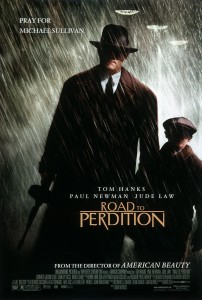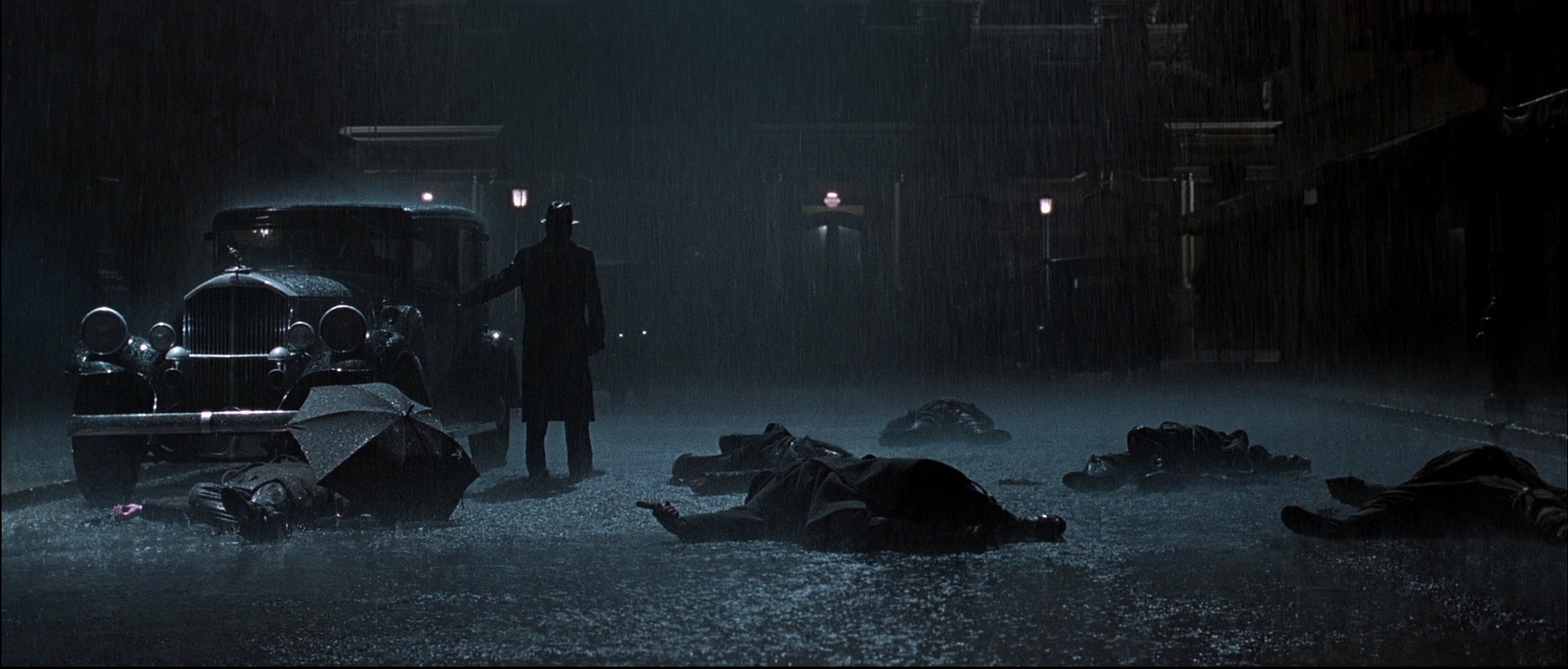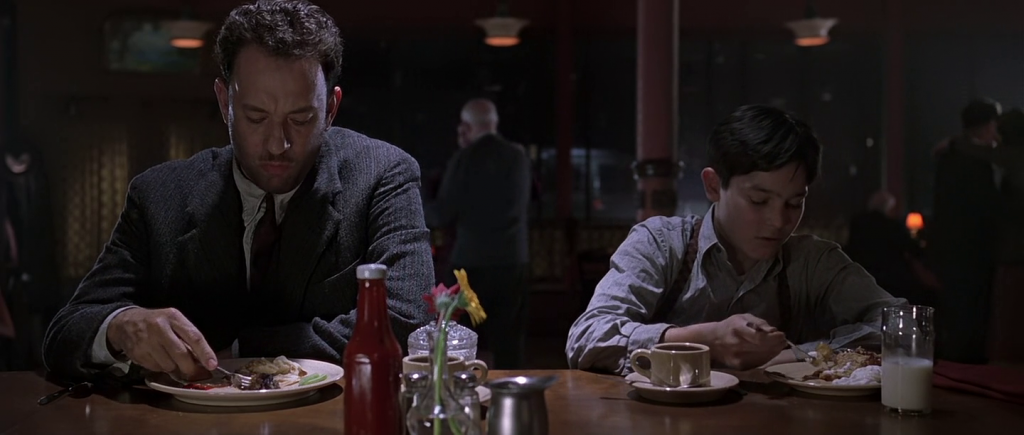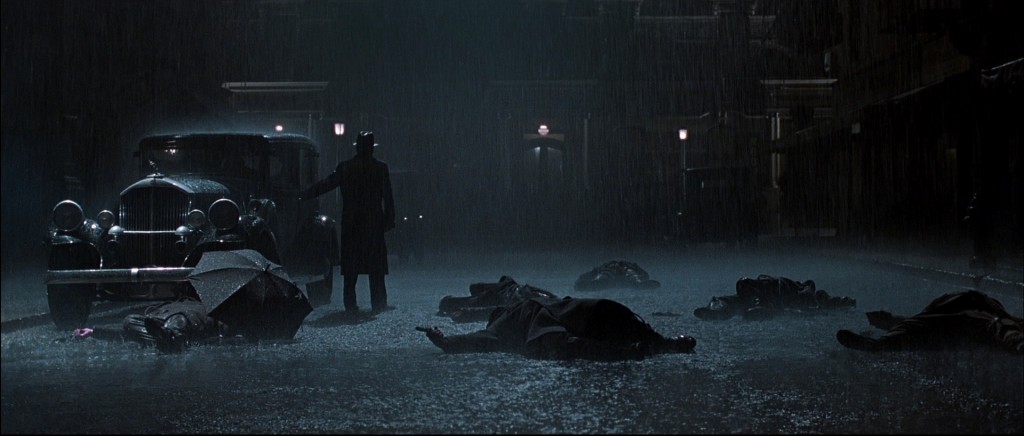Unsung Gems is a look back and reflection on great motion pictures that often slip under the radar of public consciousness , whether as ignored relics of a previous era, standout efforts overshadowed by competition or circumstance, or simply unseen classics damned by a lack of time in the spotlight.
–

Directed by Sam Mendes
Screenplay by David Self
US, 2002
Anyone who still retains core doubts over Sam Mendes taking a shot at the Bond franchise should feel reassured by the fact that, despite having an undoubted reputation for art-house design and social drama, he’s a director not afraid to mix things up. Beyond 2005’s Jarhead, a war film with no war, is the more significant Road to Perdition, his follow up to the mega-hit American Beauty, and a tour de force in both enthralling action and arresting style.
Everything about Road seems to stand up and defy convention. After all, this is a gangster movie adapted from a graphic novel which somehow seems to imbue the emotional charge of a kitchen-sink drama. It’s an ‘on-the-run’ chase thriller which just happens to be one of the most gorgeously shot motion pictures ever produced, with every frame an aesthetic masterpiece of a gift from the late Conrad L Hall. We have another passed away master, the great Paul Newman, delivering his last great performance…as an unscrupulous mob boss. All-American hero Tom Hanks portrays an anti-villain protagonist, ethically unsound criminal enforcer Mike Sullivan. Jude Law is Maguire, a balding rat-like assassin as likely to turn stomachs as pull the trigger on his quarry. And James Bond himself, Daniel Craig, trades in heroic grittiness for petty and psychotic neurosis as a deranged and repugnant man child. Nothing works the way it’s supposed to.
That’s not to say that, as a film, Road to Perdition is trying to do anything other than tell its own story, one that when stripped down to its basics is as old as the movie business itself; the father-son forced together plot. Hanks’ Sullivan is a trusted employee and surrogate son of Newman’s John Rooney, owing all he has to the ageing Irish don. That’s all torn apart when Sullivan’s eldest offspring Michael Jr. (Tyler Hoechlin) witnesses an off the books execution by Rooney’s heir, Craig’s Connor. Despite assurances that all is well, Connor cannot let this loose end lie, and reacts by wiping out Sullivan’s family, everyone except the two Michaels. When pushed to take a side, John Rooney chooses bloodlines, and now the surviving Sullivans are a liability. Cue a road trip both figurative and literal, one spiced up when necrophile hitman Maguire is hired to give chase.
Rather than become a raging and baleful saga of revenge, however, Road chooses to adhere to the underlying theme previously mentioned, the paternal bond. Mike Sr. is not only endeavoring to keep his child safe, he’s also having to break down the walls that have formed between them, a frosty layer of resentment coming with the dawn of rebellion and angst, fully exacerbated by the despairing loss of family and years of growing distance between the two.
Back home, John Rooney’s decision to back his reprehensible and egomaniacal son Connor has seen him not only turn his back on Sullivan, a figure of greater mutual respect, but actively hunt him. In such a zero sum game, one of them has to die. That Connor in fact despises his father, and plots against him while impatiently awaiting his ascension to the top of the tree, makes the mandatory choice tragic and ultimately costly. These character dynamics and studies are given top billing above the bank robberies and the assassination attempts.
Ultimately, the film’s heart and the turnaround which makes the action compelling can be routed back to the word play of its title. The protagonists are indeed traveling to the town of Perdition, but the damning of the soul is also a prevalent core point. Mike Sr. may have come from a profession or murder and other organized crimes, but he, like Rooney, is very self aware when it comes to black and grey morality. He doesn’t see redemption at the end of the road, is under no illusions about his ultimate destination. However, the same doesn’t apply to his son, who he fully intends to keep pure, regardless of the cost. This determination can be encapsulated by his church basement confrontation with Rooney, once father-figure now enemy. “This is the life we chose, the life we lead” Rooney says bitterly “And only one thing is certain; none of us will see heaven”. “Michael could” Mike Sr. replies hopefully.
Set against the backdrop of the Prohibition era in full swing, automobiles and off road diners, Road is a film overwhelmingly stunning both in cinematography and in story, canvassed by Thomas Newman’s resonant score, and breathtaking in its design. From the jaw dropping vista of the Sullivans arriving in Chicago, to the intricately set up shots mimicking the works of Edward Hopper, down to the serenity and transcendent power of the ‘gunfire in the rain’ sequence, this is a film loaded with visual poetry to accompany the plotted emotional upheaval. That Hall was posthumously awarded an Academy Award for his efforts, his third such gong, is only fitting.
That excellence, brilliance even, extends out to the uniformly outstanding cast too. It seems almost unfair that only one of the actors on show gained Oscar recognition, Paul Newman’s fully deserved nomination, when each shine so brightly. Hanks underplays Sullivan, hits all the right keys of a conflicted soul who’s internal machinations are kept concealed, and provides a keen reminder that he is such a household name for a reason. Jude Law is a brilliant villain, memorably creepy and unsettling despite relatively limited screen time, and Daniel Craig brings to the film a deeply seeded, complex characterization of frayed wires and contradictions. Tyler Hoechlin, who won a 2,000 strong audition process to claim the role of Michael Jr., more than justifies his place. You could tentatively make the argument that, like a more legendary gangster film, Road should be held up as a crowning achievement, in part because there isn’t a technical flaw to be found. It looks, reads, and plays out perfectly.
All the while, everyone is playing against type, both in front of and behind the camera. This is still a conventional crime drama thriller we’re speaking of here, albeit one that quietly fights off archetypes and stereotypes to provide a satisfying, powerful human story. Even the most cynical of filmgoers can appreciate the vision and the empathetically pleasing undercurrent within the story. In effect, this a movie with a strong basic plot framed by aesthetics that remind us why we still use the term ‘motion picture’. The pictures in motion here are, frankly, beautiful.
So, Mendes doing Skyfall shouldn’t really cause any concern for anyone. If the director can bring so much to a comic book adaptation, a gangster movie to boot, the neo-Bond franchise shouldn’t be too great a concern. At the very least it’ll look amazing.
Scott Patterson




